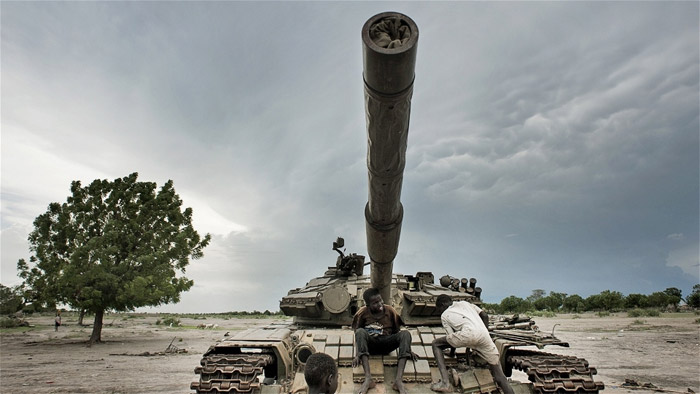President Salva Kiir has at last signed for peace with his adversary, ex-vicepresident Machar. The peace agreement gives room to even out extreme differences between parties in the conflict. However the fighting has not completely stopped and rivalry is still tangible, as are the widespread effects of the struggle.
The war in the worlds’ youngest country started two and a half years ago as a power struggle between politicians and ended up in an ethnic conflict that spiraled into widespread violence and revenge. According to the UN more than 70 percent of the 12 million civilians depend on foreign aid and 2.2 million people are displaced.
What is this devastating war about?
South Sudan became independent after two long lasting independence wars (1955-1971 and 1983-2005). In 2011 South Sudan became an sovereign state. The rebels became politicians and had great difficulty in sharing power, in part due to ethnic differences. A militarized society and conflict about the sharing of oil revenues amplified disparities that lead to another war in December 2013. This new war caused thousands of victims and a flow of 2.2 million refugees.
Why have peace talks taken place in Addis Ababa, Ethiopia?
Neighboring states and the African Union have initiated peace talks and chose Addis Ababa as a meeting point. The negotiations are lead by IGAD (Intergovernmental Authority on Development) formed by Djibouti, Ethiopia, Somalia, Eritrea, Sudan, Kenya and Uganda. Later in the process ‘IGAD Plus’ was formed including representatives of China, the European Union, Norway, the UK, US and the United Nations.
What does PAX do in South Sudan?
PAX works with civilians and partners towards peace. In May of last year we helped facilitate a peace deal in the state Jonglei, in cooperation with South Sudanese religious organisations and the Dutch minister of Aid and Trade Ploumen. PAX supports bishop Paride Taban, frontrunner of the peace village Kuron. We successfully promote programs in the border area of South Sudan, Uganda and Kenya that deal with conflicts about cattle raiding and reprisals between pastoral people. PAX leads programs that strive towards a fair share of oil revenues for local communities. Together with local partners PAX we support modification of the South Sudanese constitution that ensures more influence of civilians.
What would signing of a peace deal mean for the people of South Sudan?
A peace deal would mean the beginning of a long road to real peace. It could prevent more bloodshed among civilians, although not all fighting would stop immediately. It would be a blessing for refugees because emergency assistance could be delivered unimpeded to those in need. After, the work can start to realise improvement between ethnic groups and a fair deal on the revenues of oil exploitation. A new government can battle corruption. The country could free itself from its military past, implement good governance, fair justice and roads to development.
What can you do to help out?
An important root of conflict is the influx of arms into South Sudan. Ever more weapons end up not only in the hands of the government and other warring parties but also in the hands of civilians. This extends and intensifies conflicts in the country. That should stop. You can appeal to the United Nations to implement an immediate arms embargo. You literally can let your voice be heard for an arms embargo at www.shoutdownarms.com




